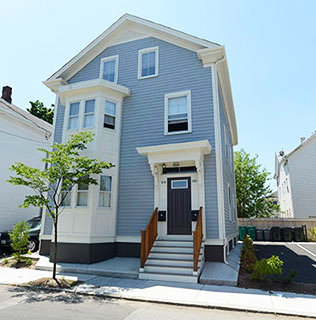We need to do housing to improve educational outcomes
What is Massachusetts doing differently that explains their success in education? Investing 20 times the amount in affordable housing, compared to Rhode Island
Imagine if the CEO of Deloitte had to spend five hours in a hospital emergency room, waiting to be seen, because all the hospital EDs were on diversion? Imagine if the CEO of McKinsey had been placed on hold for three hours, trying to talk to a customer service representative who never answered?
PROVIDENCE – The question being posed by leaders of the R.I. General Assembly is this: What is Massachusetts doing differently that explains why their students are performing so much better than Rhode Island students are on the same standardized tests?
In their quest for answers, the legislative leaders are considering creating a new position of secretary of education. “The Senate and House are in discussions regarding education reform initiatives, and we will be soon making an announcement,” said Senate Education Committee Chair Hannah Gallo, as reported by WPRI’s Ted Nesi. “The secretary of education model is among the various options that we are examining.”
In addition to the ongoing conversations in state government, the Rhode Island Foundation has also been convening discussions between more than two dozen education stakeholders, including state and local officials, union leaders and advocates, to explore new K-12 policies, Nesi reported.
But, to come up with a better answer, I would suggest that the legislative leaders and the Rhode Island Foundation dig a little deeper to better understand the root causes that result in poor academic performance by students.
First, as a way of framing the discussion, the policy and legislative leaders need to distinguish between what economist Len Ladaro has called the difference “between consumption-oriented and investment-oriented spending,” as a way to change the basis of Rhode Island’s long-term economic mediocrity.
All-day kindergarten, Ladaro argued in a recent op-ed in The Providence Journal, is an investment-oriented expenditure – a program potentially capable of helping children become more capable of learning more rapidly and effectively.
Next, the legislative and thought leaders need to understand that inequality in education begins with inequality in housing. They should invite Richard Rothstein, a former education writer with The New York Times, to share with both groups what is known about the root causes of racial achievement gaps in school performance.
The issues are rooted in what Rothstein has documented in his recent book, The Color of Law, the systemic segregation of American communities as part of housing policy in the U.S.
To put it another way, all the policies aimed at improving student, teacher and parental engagement and the hope that they will change the outcomes are misguided if investments in new housing creation do not become the top priority when it comes to education and health policies.
Massachusetts invests $100.12 per capita on affordable homes, 20 times as much as Rhode Island, which invests $5.21 per capita on affordable homes. In 2018, a worker would have to earn $31.17 an hour and work 40 hours a week year-round to be able to afford the average rent in Rhode Island, without a cost burden.
Quite simply, the education gap between Massachusetts and Rhode Island is a housing opportunity gap.
If you want to reduce the achievement gap, do housing
In November of 2017, I was invited by Princeton’s Woodrow Wilson Center to help New Jersey’s education leadership understand how the social and environmental determinants of child well being were impacting their school achievement results.
At the close of this daylong event, Anne Currie, professor of Economics at Princeton University, showed what had been learned in Rhode Island about the impact of local enforcement of housing standards in Rhode Island on the achievement gap between white and black children. She closed her presentation with this statement: “If you want to reduce the achievement gap between black and white children, do housing.”
More than the current focus of our economic policies on creating jobs, we need to shift resources toward creating housing, because housing is where jobs go to sleep at night.
Better, affordable, safe housing is also the best therapy to cure disparities in health outcomes as well as education outcomes, reducing the incidences of new childhood lead poisoning and asthma visits to emergency rooms, both directly related to school absenteeism and increased health costs, burdens that fall predominantly on our minority populations in our core urban cities.
The budget dilemma
We are likely to be facing reduced revenue in coming months as a challenge to budgeting for the next fiscal year. In May, we will again hear the budget projections from our case estimating conferences that drive the bottom line for taxing and spending in coming months.
Without a better understanding of the way we are spending limited resources, we will continue to see our budget process controlled by the special interests and their lobbyists on Smith Hill. If we keep looking under the lamp post for our “lost keys,” because that is where the light is, we will continue to invest in ways that will ignore the most important determinants of school achievement disparities between Massachusetts and Rhode Island.
Peter Simon is a frequent contributor to ConvergenceRI.






